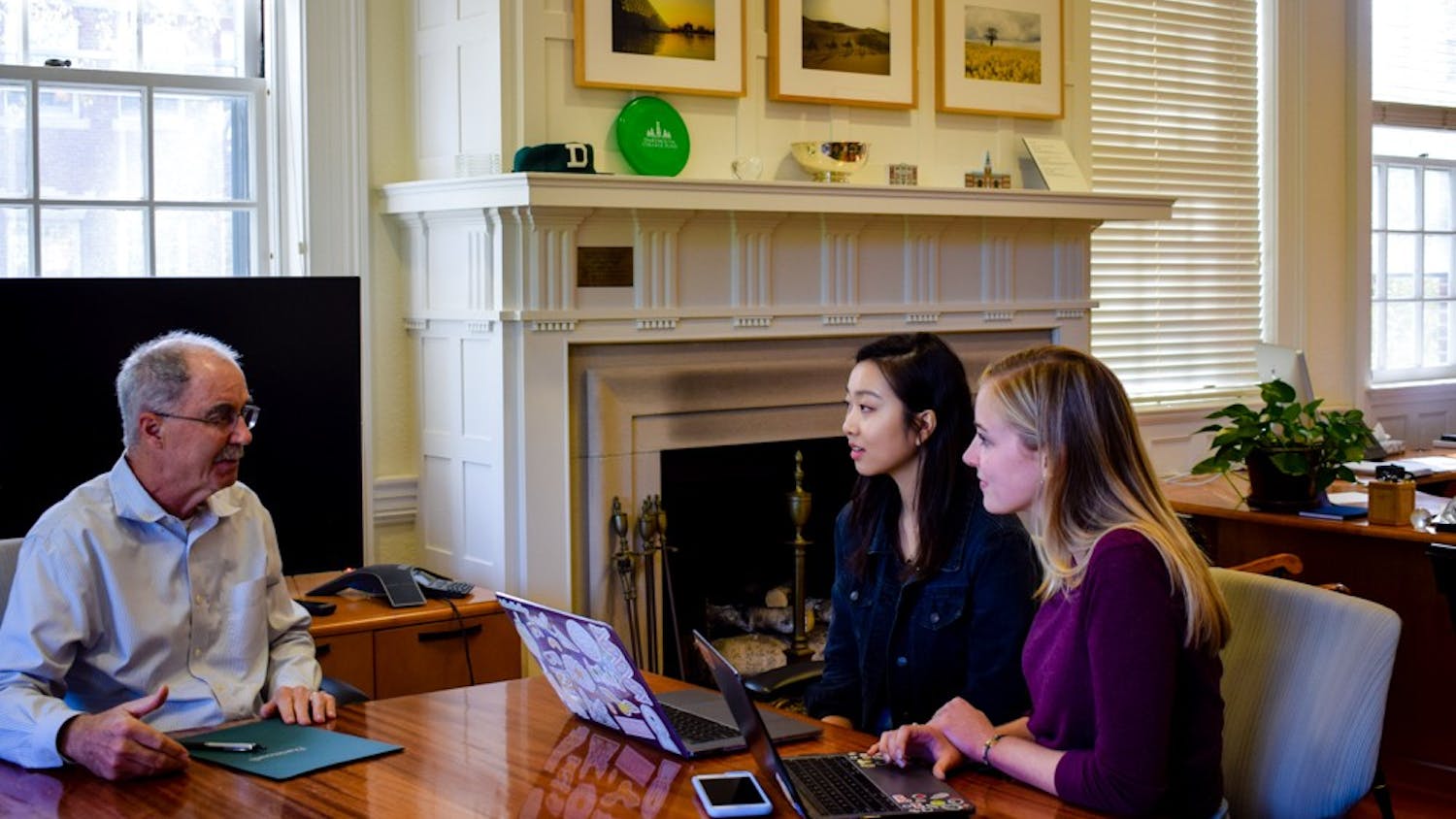In conversations about mental health across college campuses, students are usually the focus of what has become a national hot topic. However, faculty and employees, who create the fabric of this academic backdrop, are rarely mentioned.
According to Dean of the Faculty Elizabeth Smith, the reason for the spotlight on students lies partially in the immersive structure of student life at residential colleges.
“The students are here all the time, so you’re seeing their professional day life and their social life contained within this environment,” Smith said. “The faculty come to work and then they go home, so you might not be aware of the stressors that might exist at home or otherwise.”
According to Smith, in response to events that could be perceived as traumatic for community members, extra information is added to faculty-wide announcements about available counseling services. Support services for Dartmouth faculty are available through the College chaplain’s office, deans, as well as the Faculty/Employee Assistance Program. All faculty have access to mental health benefits, although faculty can also seek providers through their healthcare plan rather than the F/EAP.
The College’s F/EAP, located in the United Church of Christ building, partners with online-provided GuidanceResources to support faculty and employees as well as their family members. F/EAP has been available for years at the College, but around two years ago, the system moved from an internal program to a hybrid format in which faculty can be referred to third parties, according to F/EAP counselor Sharon Morisi.
“It gives people a wider variety ... If you want to see somebody that’s closer to where you live, that’s an option ... Others will want to see somebody that really knows Dartmouth,” Morisi said. “It gives people a little more choice and flexibility.”
Compared to other higher education institutions, Dartmouth’s faculty mental health services are “fairly comparable,” according to Morisi. She added that there has been a significant trend across universities to contract larger companies and move away from internal systems, as the College has done with GuidanceResources.
The dean of the faculty maintains an awareness of the general well-being of the faculty through the Office of Institutional Research. The office is tasked with providing objective data to support institutional improvements, mainly by conducting surveys that cover a wide variety of campus topics.
In addition, Dartmouth offers accommodations and flexibility to support its faculty members. The College’s faculty exercises a certain amount of freedom in what time of day and quarter that they teach, according to Smith. If faculty need to work with accommodations or mental disabilities, they have the flexibility to cater needs to their schedule.
The chairs of academic departments can serve as a guide for faculty to navigate available resources. Faculty are divided into four departments that are each headed by an associate dean who can act as another point of contact, according to Smith.
Most colleges offer mental health services through their respective insurance plans, but few have a designated position specifically meant to assist faculty in navigating the resources available to them. In an effort to make resources more readily accessible for faculty, the University of California, Irvine created a position — coordinator of faculty and staff mental health care and respondent services — in July 2016 to specifically help employees in need of immediate help and to serve as a guide to external resources.
Negar Shekarabi, who has served in this position for the past three years, assists with increasing collaboration between faculty members and her office on mental health training and stigmatization efforts.
According to Shekarabi, the stigma surrounding mental health proliferates through academic settings.. Because people’s careers are built around their minds, there are high stakes associated with disclosing mental illness.
“Faculty often view themselves in terms of the value that they bring … [because] the best tool is their mind and I think there’s a lot of stigma around disclosing that ‘I might be struggling with something related to my mental health,’” Shekarabi said. “That creates an implication about me to others that ‘I somehow can’t do the work that I’m here to do, that I’m not as good as people think that I am.’ I think that’s a lot of the threat around the perceptual worries that staff might have.”
Faculty who are early on in their careers are particularly susceptible to the pressures associated with publishing research and working toward tenure, according to Shekarabi.
“Those years in particular are just inherently very stressful, and if they happen to have some underlying mental health concerns that are predated to their time as a faculty member, that’s the time we tend to see things flare up for folks when they’re going through that process,” Shekarabi said.
According to Smith, the high pressure surrounding tenure is a by-product of sustaining a level of excellence.
“The question is, ‘How do you guide faculty and allay their concerns as much as you can, while still maintaining high standards?’” she said.
Linguistics professor David Peterson commented on the difficulties of establishing a work-life balance.
“There are the professional stressors — teaching stress, research stress ... we have additional jobs besides being professors and researchers ... so the time balance between all of those things are the overarching issue,” Peterson said.
While raising awareness of mental health is a continual process, students and professors have commented on the supportive environment that the College fosters.
“Dartmouth is so undergraduate-focused and it really shows in the way that professors address their students,” said Amanda Chen ’21, founder of the campus group Dartmouth Mental Health Student Union.
Peterson said he sees little issue with disclosing mental illness amongst Dartmouth colleagues.
“Dartmouth is a very supportive environment in almost all respects, and so I think if a professor disclosed to their colleagues … [they] would try to be as supportive as they could,” Peterson said.
In regards to suicide prevention, training can go a long way, according to Shekarabi.
“I’m always surprised when we’re presenting to staff how they don’t necessarily feel very confident to have those conversations with people,” Shekarabi said. “I’ve found that even just the simplest level of training and giving people an opportunity to practice how they would ask someone if they were worried about them ... makes them much more likely to actually do it when it happens in real life.”
According to Smith, mental health awareness relies on creating and maintaining a culture of empathy between all members of the community.
“I think it would be great to, from the student side of things, recognize the humanity of the faculty,” Smith said. “They’re people who are not only really amazing scholars who are doing everything they can because they love to teach their students, but they also go home and many of them are raising children, taking care of aging parents, and just have all kinds of stressors outside of their academic life.”
Correction appended (October 31, 2019): This article originally stated that the Office of Counseling and Human Development provides resources for faculty; however, the Counseling Center only serves undergraduate and graduate students. The article has been updated to reflect this correction.




